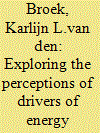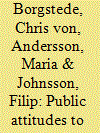|
|
|
Sort Order |
|
|
|
Items / Page
|
|
|
|
|
|
|
| Srl | Item |
| 1 |
ID:
098686


|
|
|
|
|
| Publication |
2010.
|
| Summary/Abstract |
Achieving a 'step-change' in energy efficiency behaviours will require enhanced knowledge of behavioural drivers, and translation of this knowledge into successful intervention programmes. The 'Energy Cultures' conceptual framework aims to assist in understanding the factors that influence energy consumption behaviour, and to help identify opportunities for behaviour change. Building on a history of attempts to offer multi-disciplinary integrating models of energy behaviour, we take a culture-based approach to behaviour, while drawing also from lifestyles and systems thinking. The framework provides a structure for addressing the problem of multiple interpretations of 'behaviour' by suggesting that it is influenced by the interactions between cognitive norms, energy practices and material culture.
The Energy Cultures framework is discussed in the context of a New Zealand case study, which demonstrates its development and application. It has already provided a basis for cross-disciplinary collaboration, and for multi-disciplinary research design, and has provided insights into behavioural change in a case study community. As the conceptual basis of a 3-year research project, the framework has further potential to identify clusters of 'energy cultures' - similar patterns of norms, practices and/or material culture - to enable the crafting of targeted actions to achieve behaviour change.
|
|
|
|
|
|
|
|
|
|
|
|
|
|
|
|
| 2 |
ID:
166517


|
|
|
|
|
| Summary/Abstract |
Many models have been applied to predict energy use and savings, yet few studies have investigated people's own perceptions of what drives their energy use. Understanding these perceptions can help design energy policy that is likely to be trusted and perceived as credible. This study assessed the perception of the drivers of energy use among young adults, who had recently become independent energy consumers, but were not yet paying for their energy bills. Focus groups were conducted in which the drivers of energy use were discussed, and discussions were analysed using a framework of a successful existing behavioural model – the Comprehensive Action Determination Model – that includes both conscious and unconscious drivers of energy consumption. The findings show (1) participants did not tend to believe they saved energy to conserve the environment, (2) adherence to egoistic values, apparent in the lack of motivation to save energy in the absence of financial incentives, and (3) strong awareness of energy habits. Policy makers targeting young adults' energy use are advised how to align energy policy with these perceptions.
|
|
|
|
|
|
|
|
|
|
|
|
|
|
|
|
| 3 |
ID:
121354


|
|
|
|
|
| Publication |
2013.
|
| Summary/Abstract |
This work explores public opinions regarding climate change and mitigation options and examines how psychological factors, such as attitudes, norms, and willingness to pay, determine self-reported energy-efficient behaviour. The aim is to create knowledge for the design and implementation of policy measures. The results of an opinion poll conducted in 2005 and 2010 are compared. The number of respondents favouring new technologies as a way to reduce emissions was substantially lower in 2010 than in 2005, whereas there was an increase in the number of people who acknowledged that lifestyle changes are necessary to counteract climate changes. This indicates an increased awareness among the public of the need for lifestyle changes, which could facilitate implementation of policies promoting environmental behaviour. Renewable energy and energy saving measures were ranked as the top two measures for mitigating climate change in both polls. In determining which energy behaviours of the public are determined by psychological factors, an analysis of the 2010 survey revealed that respondents with pro-environmental attitudes towards global warming favour significantly increased use of renewable energy technologies and greater engagement in energy-efficient behaviours.
|
|
|
|
|
|
|
|
|
|
|
|
|
|
|
|
| 4 |
ID:
110727


|
|
|
|
|
| Publication |
2011.
|
| Summary/Abstract |
The main purpose of this paper is to characterise quantitatively the impact of income on household energy consumption in the residential and transport sectors. Starting from the data collected in a paper survey, we analyse the extent of the constraint experienced by households in terms of equipment purchasing behaviour and daily energy consumption. This analysis shows that the least well-off households are particularly constrained since the share of their budget represented by these energy services is very large (15-25%), and this corresponds to a level of energy service well below that of the better-off households. The case of space-heating shows a factor of 2 in terms of level of comfort achieved between the extreme 10-percentiles. These households also face a strong capital constraint for equipment purchases. This leads either to a large increase in the required rate of return or to a reduction in the proportion of households that are prepared to replace their equipment earlier. The least well-off households are thus doubly constrained, since it is more difficult for them to invest. In our opinion, it is crucial to take into account this observation in the context of political measures aimed at reducing households'CO2 emissions.
|
|
|
|
|
|
|
|
|
|
|
|
|
|
|
|
|
|
|
|
|